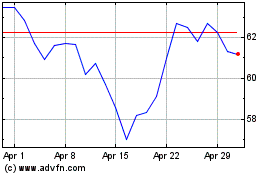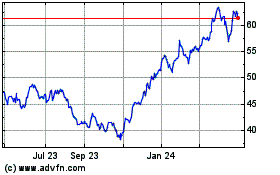ETFs Could Prompt New Rules, SEC's White Says
May 20 2016 - 8:50AM
Dow Jones News
WASHINGTON—U.S. market regulators are conducting a sweeping
review of exchange-traded funds, weighing the possibility of new
rules aimed at trying to contain trading and pricing disruptions
that can harm investors.
The Securities and Exchange Commission is examining the full
life cycle of ETFs, from the role that Wall Street market-makers
play in creating and selling shares to the sales practices of
brokers who sell the funds, SEC Chairman Mary Jo White said in
remarks prepared for a conference in Washington.
"Despite the popularity and broad success of these funds, their
history is not without some turbulence," Ms. White said in a speech
to be delivered Friday to the Investment Company Institute.
"Further regulatory steps beyond additional disclosures may be
needed to address some of these issues."
ETFs have flourished over the past decade as the variety of fund
strategies proliferated and their assets increased fivefold to $2.1
trillion. But extreme trading gyrations that occurred last August,
when severe price swings led to trading halts in more than 300
ETFs, have spurred the SEC to examine "these events and any broader
implications they may have for how we regulate ETFs," Ms. White
said.
Ms. White said the agency is specifically analyzing the role
that large Wall Street dealers play in keeping the price of ETF
shares in line with their underlying portfolios of stocks or bonds.
That arbitrage activity is critical for making sure investors don't
buy or sell ETF shares at prices that are out of whack with the
fair value of the fund's assets.
The tight relationship between ETF prices and the funds'
net-asset values broke down on Aug. 24, 2015, when dozens of them
traded at a sharp discount to the sum of their holdings. In a paper
published in February, SEC economists blamed the volatility on a
perfect storm of heightened trading volume and a withdrawal of
liquidity by market makers.
Ms. White also said Friday that the SEC is reviewing ways to
improve the "form, content and delivery" of mutual fund
disclosures. The agency is considering, for instance, steps that
would make it easier for investors to understand how fees eat into
their returns, she said.
"A fund's disclosure of fees and expenses plays a pivotal role
in informing investors about their fund investments," Ms. White
said.
Write to Dave Michaels at dave.michaels@wsj.com
(END) Dow Jones Newswires
May 20, 2016 08:35 ET (12:35 GMT)
Copyright (c) 2016 Dow Jones & Company, Inc.
Citigroup (NYSE:C)
Historical Stock Chart
From Mar 2024 to Apr 2024

Citigroup (NYSE:C)
Historical Stock Chart
From Apr 2023 to Apr 2024
